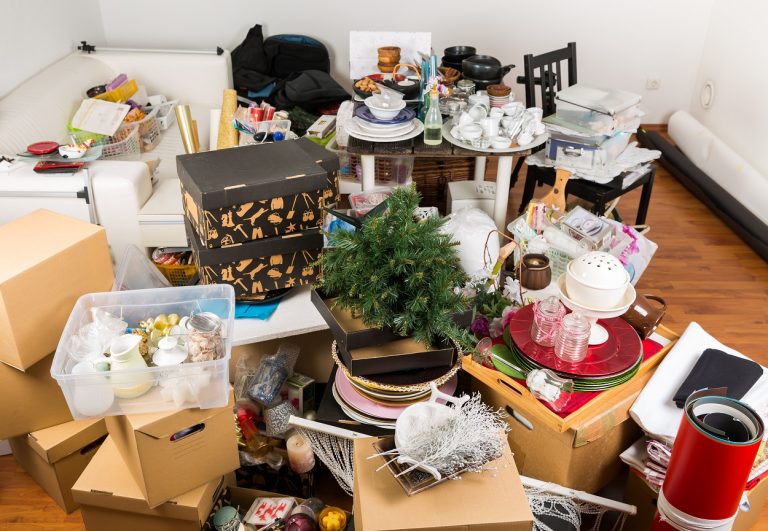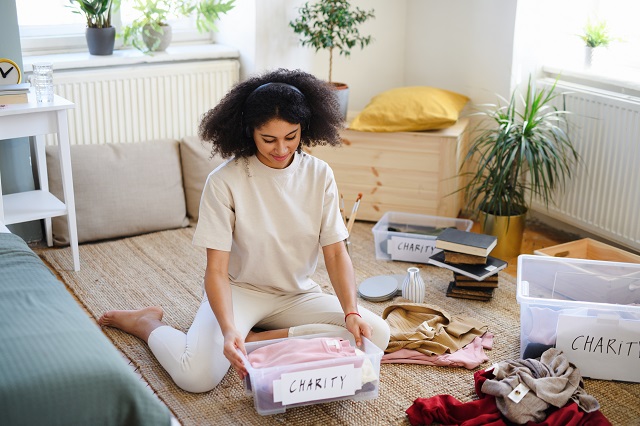
Messy room full of clutter and junk – Compulsive hoarding. Hoarding disorder.
Start your 2022 on a positive note by getting rid of all the things you no longer need and want. Decluttering your home doesn’t mean throwing out everything you love. Instead, it’s about learning to live with less, so you have more space to create the life and lifestyle you aim for. You can begin by sorting through your stuff and donating the items you don’t need anymore.
You see, the act of giving away things to people who need them will offer you an immediate sense of relief and lighten your load emotionally. Besides, wouldn’t it be better to give your unused and excess possessions, such as old laptops or other gadgets, a new lease on life by donating them to folks who will find a use for such items? Companies or groups such as Easy Donation Pickup and other services in your area can help you tidy up your home by picking the items you want to donate.
If you want to have a more minimalist start of the year, here’s a guide to decluttering your home for 2022.
-
Start Small
If you’ve never done decluttering before and decided that 2022 is an excellent year to start things fresh and clean, then you must consider pacing yourself. This task can be challenging, so if you start with a bang, you might lose steam midway and end up leaving your home messier and more disorganized than when you first started. To prevent you from being burned out, start with just tidying up the surfaces or doing one area at a time.
-
Deal With The Messiest Areas
If you are decluttering to create a home that enhances wellbeing, you may want to start by dealing with the messiest areas of your home. For instance, if you feel overwhelmed by the amount of mess in your bedroom, go ahead and start cleaning that area to create more open spaces. Aside from throwing away things that you don’t need, you can also consider replacing big furniture that makes your room look cluttered and small.
-
Consider The Four-Box Method
There are a lot of ways to go about decluttering your home. Some people who have the money and don’t like complications simply throw away everything and start anew. But since not everybody can afford to do just that, the best process to start decluttering is the four-box way. It involves setting up four big boxes and labeling them as donate, keep, throw away, and undecided.
As you clean up a room, determine which box you will put the clutter you collect. If you’re decluttering your kitchen, for example, some of the things to get rid of at the start of the year are plastic utensils and cups from fast-food restaurants, takeout condiments, chipped mugs, and dishes.
-
Don’t Forget The Paperwork
Many homeowners don’t realize the number of bills, unopened mail, and other paper clutter inside drawers, boxes, and cabinets. So, if you have a busy day but still want to tackle an easy decluttering project, you can sit down and comb through those things. Organize your recent bills and receipts in one box and throw out the ones you no longer need. You’ll be surprised to see that you have kept a bin full of unopened marketing and promotional mail that’s more than three or even five years old.
If you don’t want to get rid of old receipts or bills, you can digitize and store them by category in your laptop, storage drive, or even the cloud. Also, to protect against identity theft, don’t forget to shred documents that contain confidential information.
-
Try To Be Flexible
Deep cleaning and organizing things in your home may not be a walk in the park. Thus, don’t put yourself down if things don’t go the way you planned. Of course, you want everything to look organized, super clean, and beautiful after you declutter. But you don’t have to be a perfectionist and feel bad if you forgot to check out one corner or did not achieve the aesthetic you want in your room. There’s always a next time, thus don’t get easily discouraged if you don’t reach your decluttering goals. Be flexible enough to adjust along the way.
-
Get Stuff Fixed
Although decluttering means removing unnecessary things from a messy area, you can include fixing stuff as part of the process. For example, having that nightlamp in your bedroom repaired or even getting your garage door opener to work are things that will help improve your overall wellbeing and prevent you from buying new things. But if they no longer work and can’t be repaired, then it’s time to ditch them. You don’t necessarily need to replace damaged household items if you’ve been living your life okay without them.
-
Do It One Room At A Time
To make things more manageable, you can start organizing your home one room at a time. As mentioned earlier, you can try to do the messiest first, or you can even do it by floor level. List the areas you want to declutter in your home. Remember to include the garage, attic, closets, basement, and laundry room. Schedule the most problematic areas during the weekend or on holidays. Meanwhile, you can deal with the not-so-messy rooms on weekdays before or after you leave for work.

Happy young woman sorting wardrobe indoors at home, charity donation concept.
Here’s are some tips for decluttering each room:
Bathroom
- Make sure all drawers and cabinets are cleared out and toss expired items. Don’t forget things like medications, make-up, sunscreens.
- If you have more than one of the same things, try to combine them. For example, put all cotton swabs in one container or several shampoo refills of the same brand in one bottle.
- Upgrade your bathroom plumbing fixtures. If you’ve got old plumbing fixtures they may be bulky and take up unnecessary space. For example, consider upgrading to smart toilets, stand alone sinks and bathtubs, or even a walk-in shower rather than a shower unit could create more space and make it feel less cluttered.
- Only put items that you frequently use in your bathroom. Things that you only use sparingly should go to your linen closet.
- Keep a checklist of your toiletries and organize them in stackable bins inside a closet, so you’ll immediately know what items you need to buy the next time you go shopping.
Bedroom
- Keep your nightstand free of small knickknacks that you don’t use.
- Store your books and other reading materials inside your drawer.
- Take everything out of drawers and closets and use the four-box method to identify which items you want to keep in your bedroom.
- Put all spare items like watches, jewelry, or keys in a box or bowl to make your vanity area clean and clutter-free.
- Consider the habit of making your bed right after you wake up, so you don’t have to think about cleaning and making up the bed after a busy or stressful day.
Closets
- Remove clothes, shoes, and other items one section at a time.
- Dust each shelf before putting things back.
- If you have a tough time picking which clothes to get rid of and keep, try them on and see which fits. All clothes that no longer fit can go to your donation bin.
- You can also get rid of all the things you haven’t used in a year, except for special occasion items such as clutch bags, evening wear, or dress shoes.
- Throw away torn or excessively worn items.
- Match your socks, and anything that doesn’t have a match can go to your throwaway bin.
Kitchen
- Cupboards, drawers, and pantries are usually some of the messiest places in your home, so allocate more time in decluttering these areas.
- Deal with one drawer or cupboard at a time, but always keep in mind duplicate items. It’s common to have measuring cups stored in various cabinets. Donate duplicates to unclutter your space.
- Donate excess bowls, mugs, and plates regularly. Just have enough for your family and for entertaining guests.
- Consider the pots, pans, and appliances you have in your cupboard. If you haven’t utilized them for several months or years, give them to charity or sell them.
- Try to keep your countertops clean and bare as much as possible.
Storage Spaces
It would help if you decluttered storage areas such as attics, basements, or garages every so often. These places are usually full of boxes and old things, so you may need to allow several days to complete the task.
- Tackle the abovementioned areas one corner at a time so you won’t feel overwhelmed by the amount of trash and junk you have to check.
- Sort through every box. See what items you want to donate, throw away, or keep. Things that are no longer useful but sentimental may end up in the undecided bin. If you have very limited space, see if there are more things in the undecided bin that you can live without.
- Keep items you frequently use, such as gardening supplies and tools, in easy-to-reach areas. Place seasonal things like winter clothes or holiday decors in hard-to-access nooks like the back of the attic or high shelves.
- You can sponsor a garage sale if you have many high-ticket items to get rid of, like old furniture, appliances, collectibles, old clothes, pots and pans, books, and toys.
The Bottom Line
One thing you should know about decluttering is that it need not be an impossible job. On the contrary, you can finish this task by simply putting one foot in front of the other and having the desire to clean up your home and free your life of all the excesses. Start your 2022 right by decluttering now, and please don’t put it off until the middle of the year.
